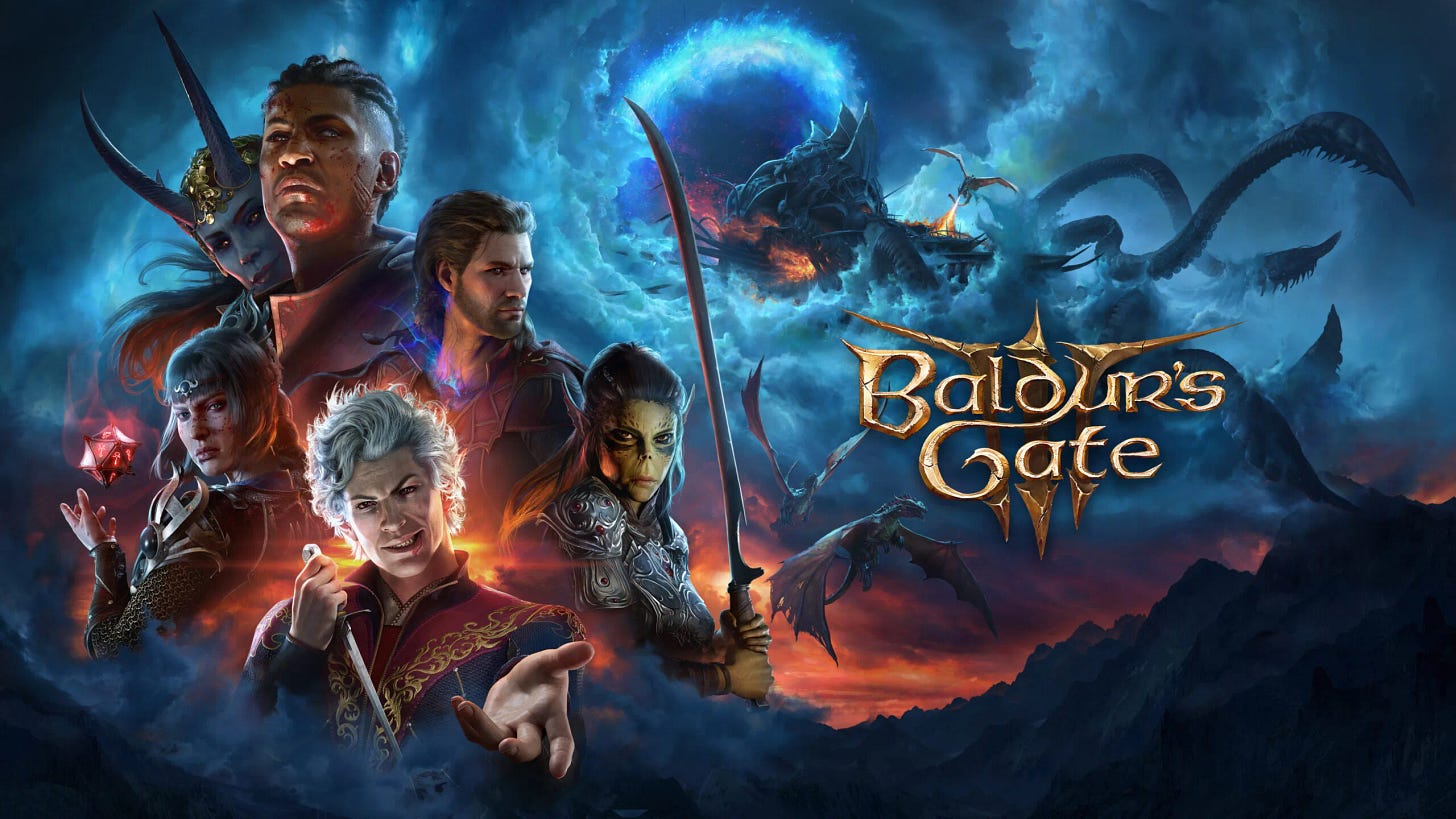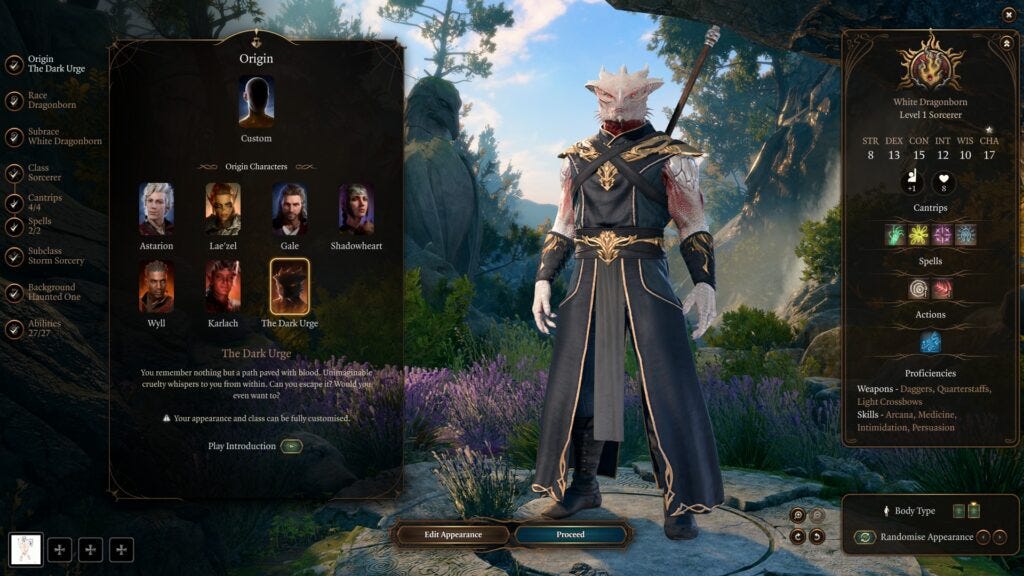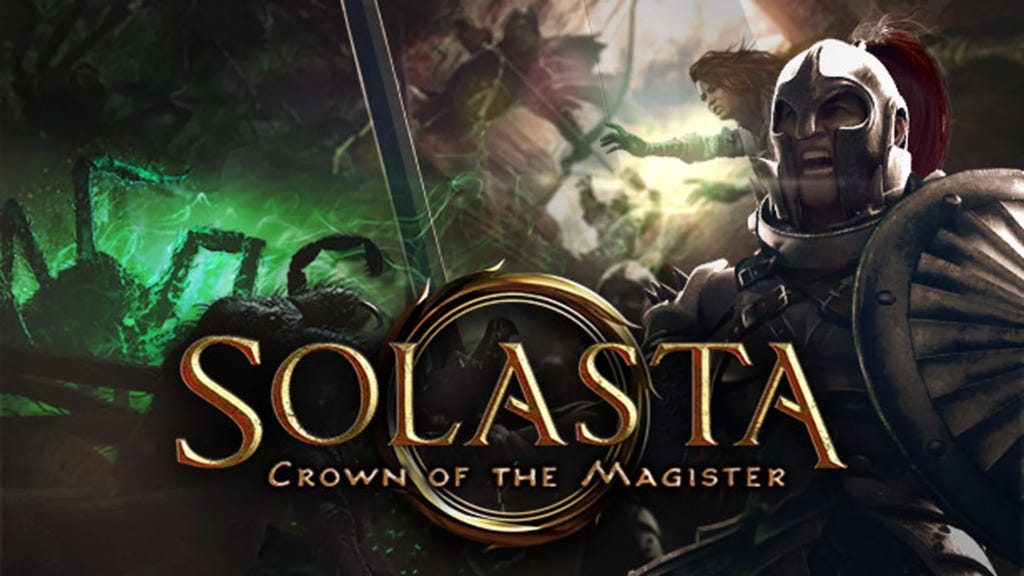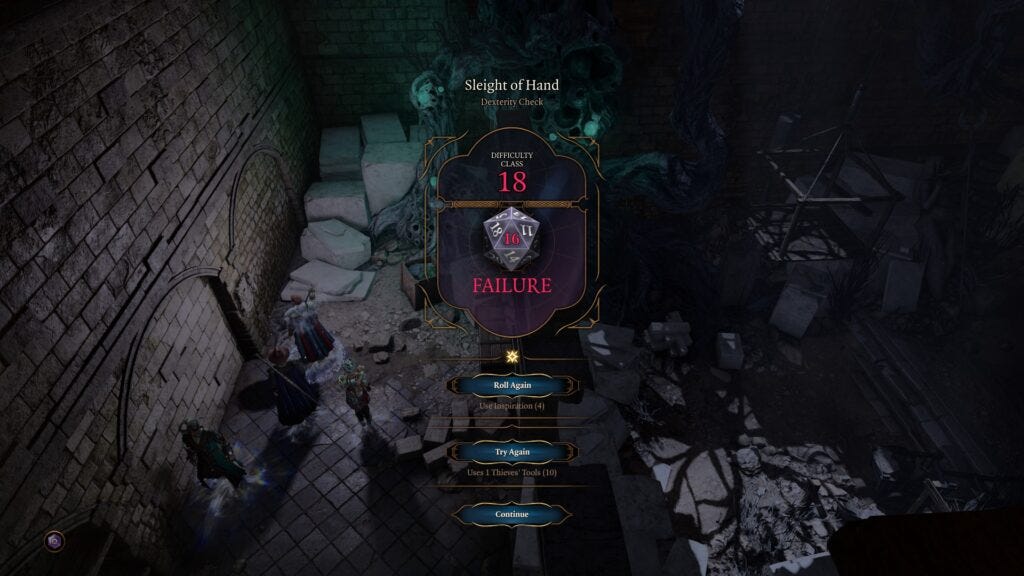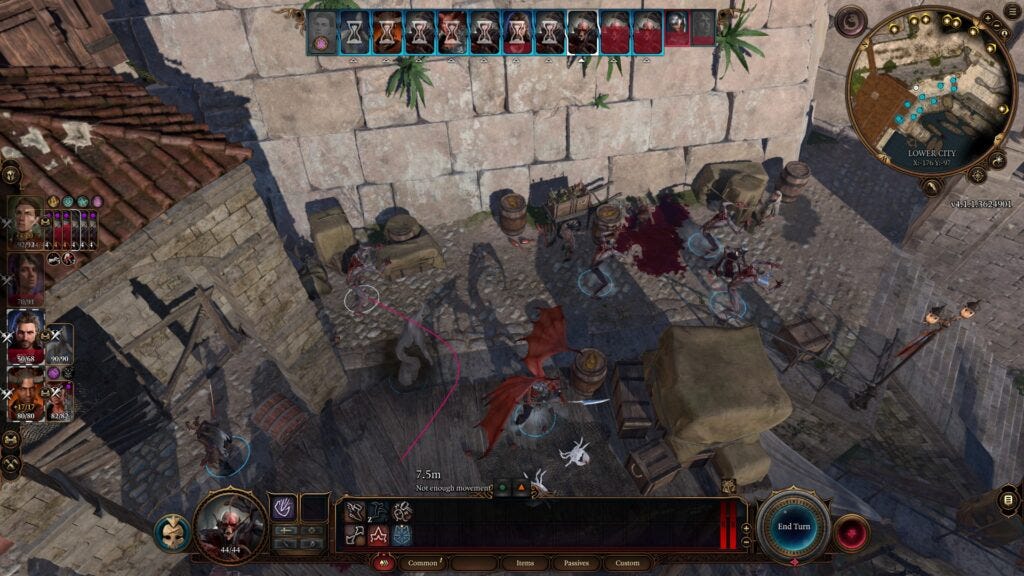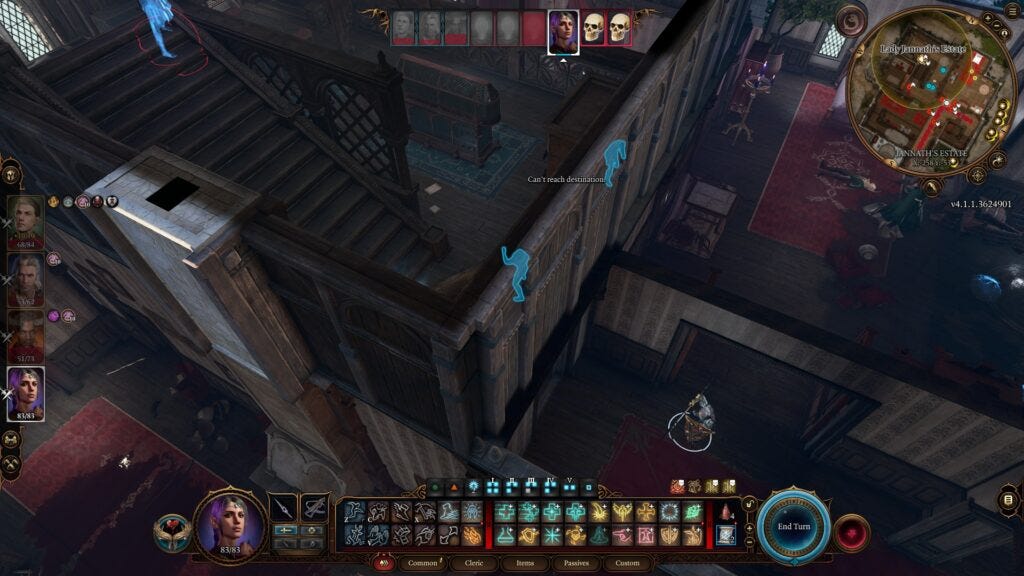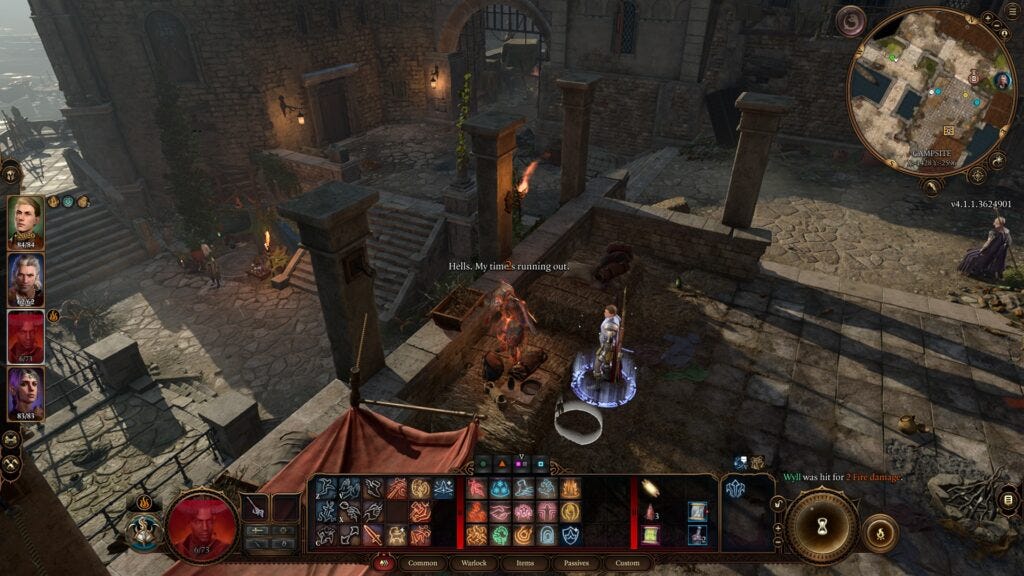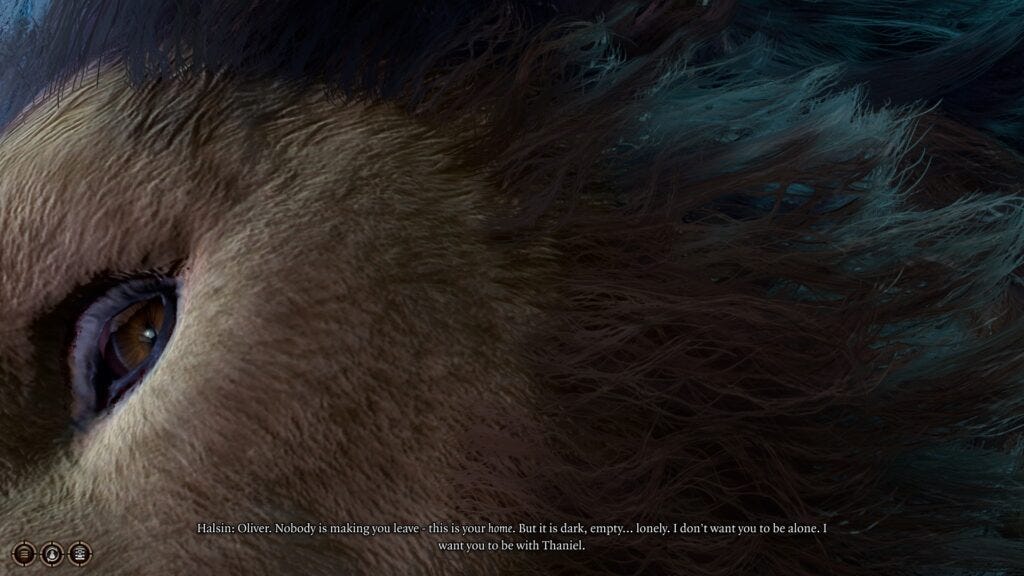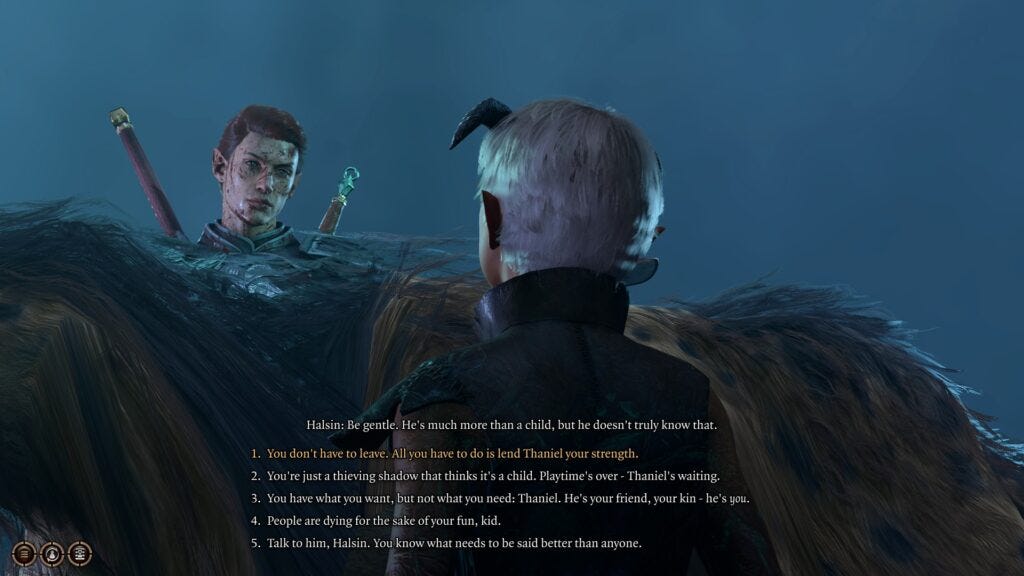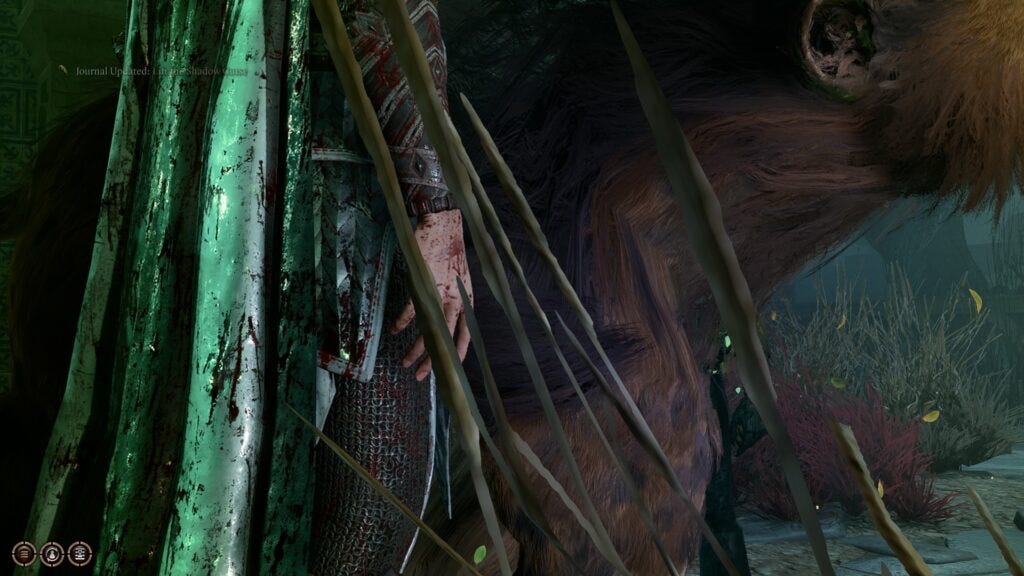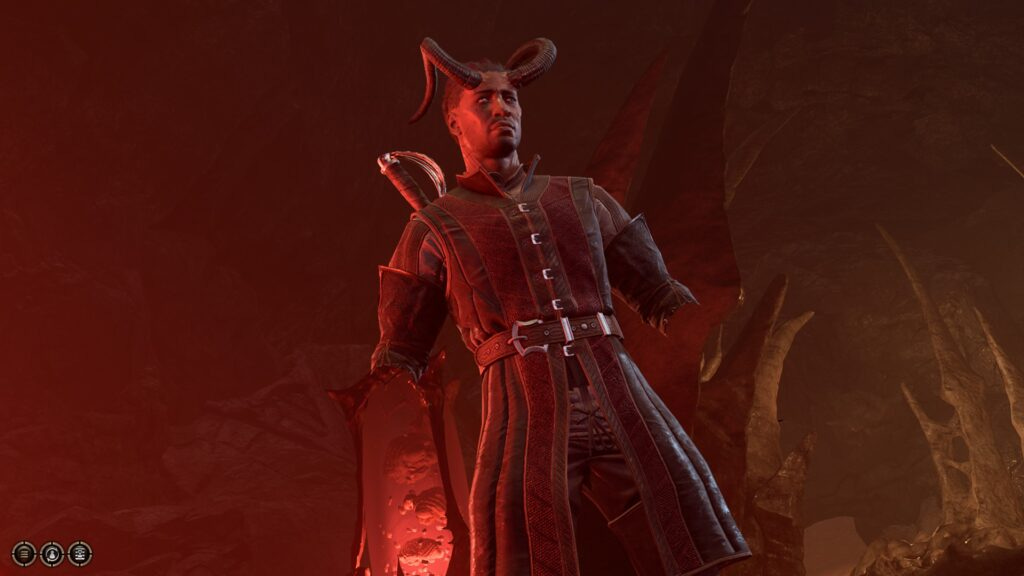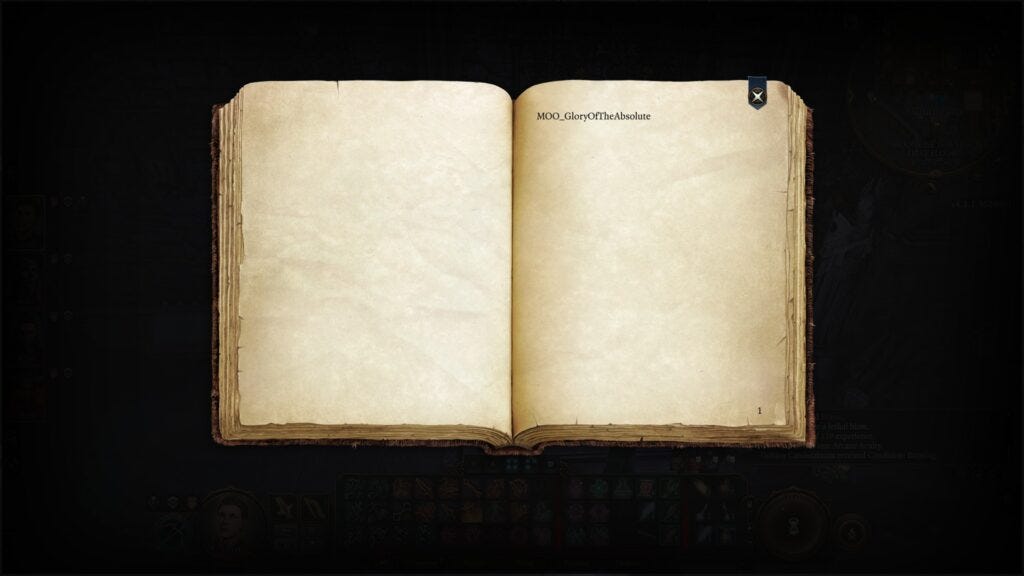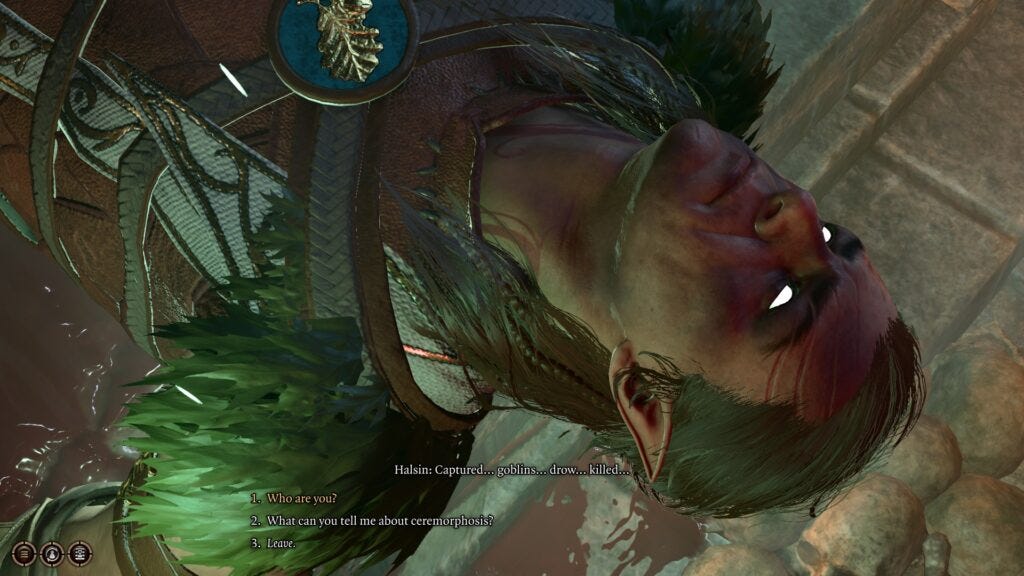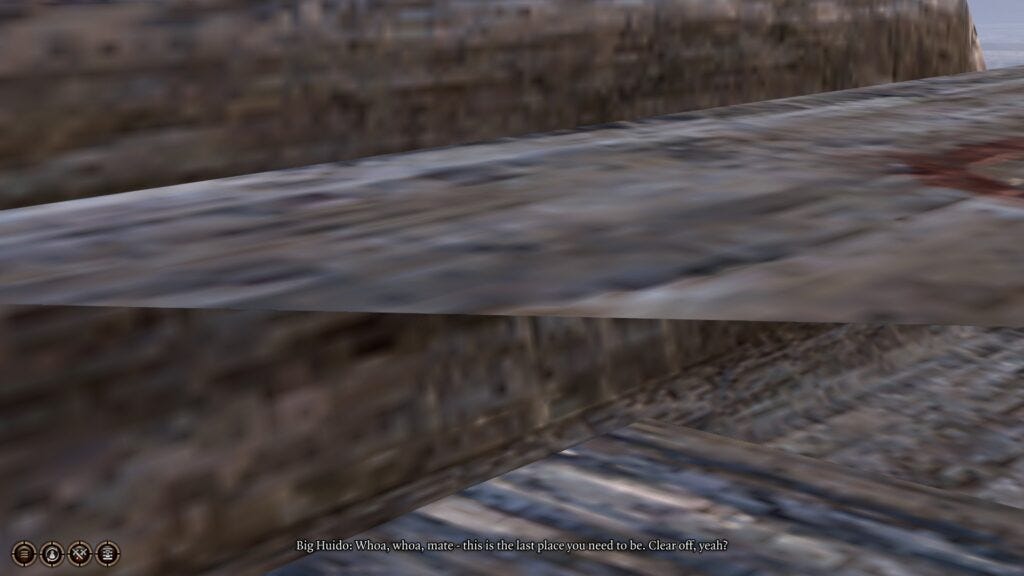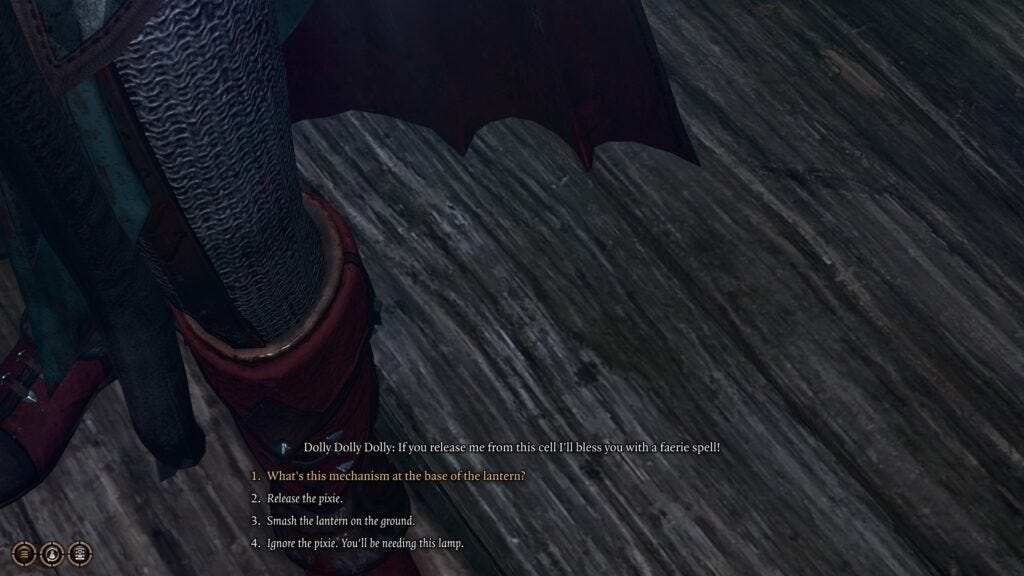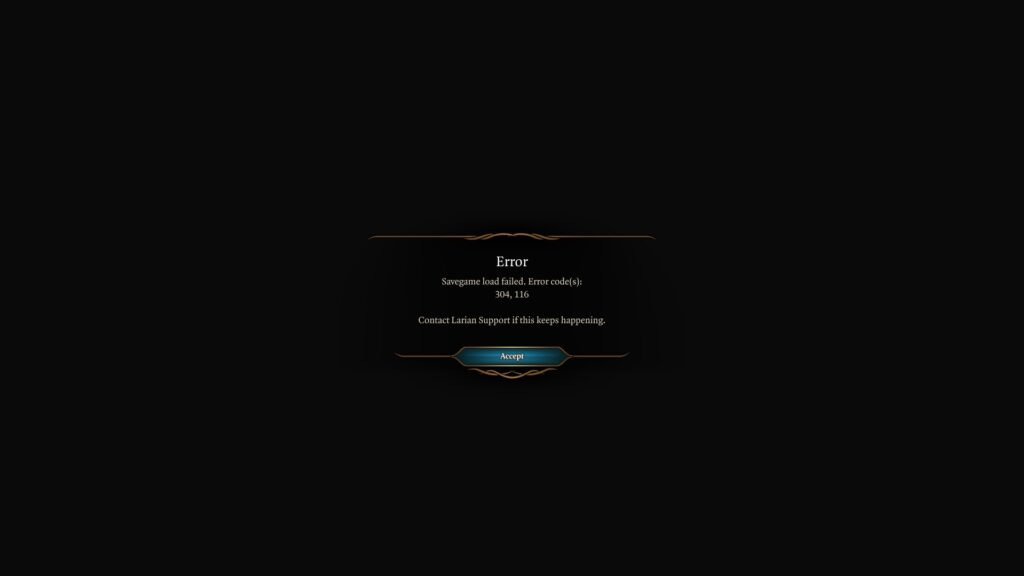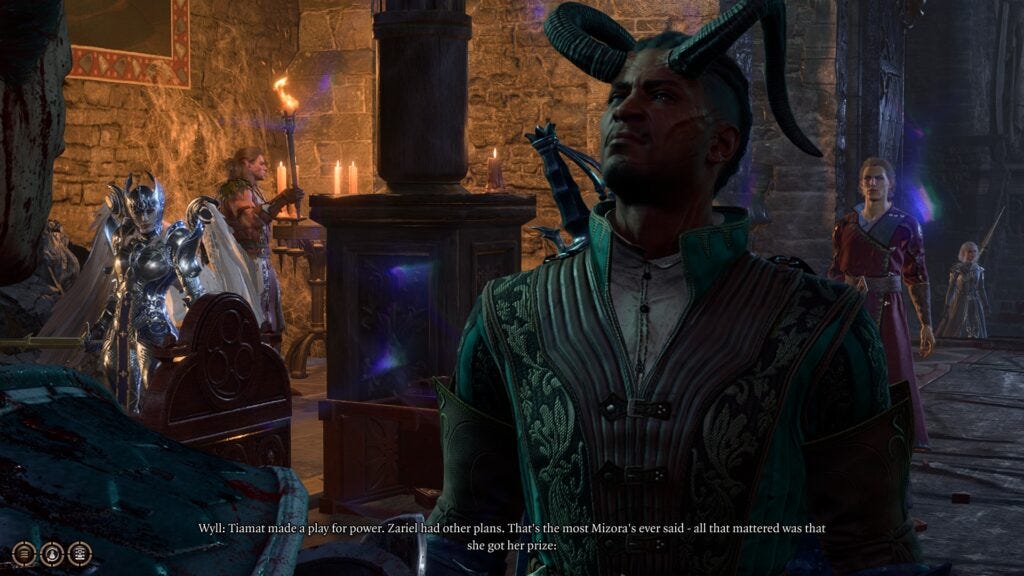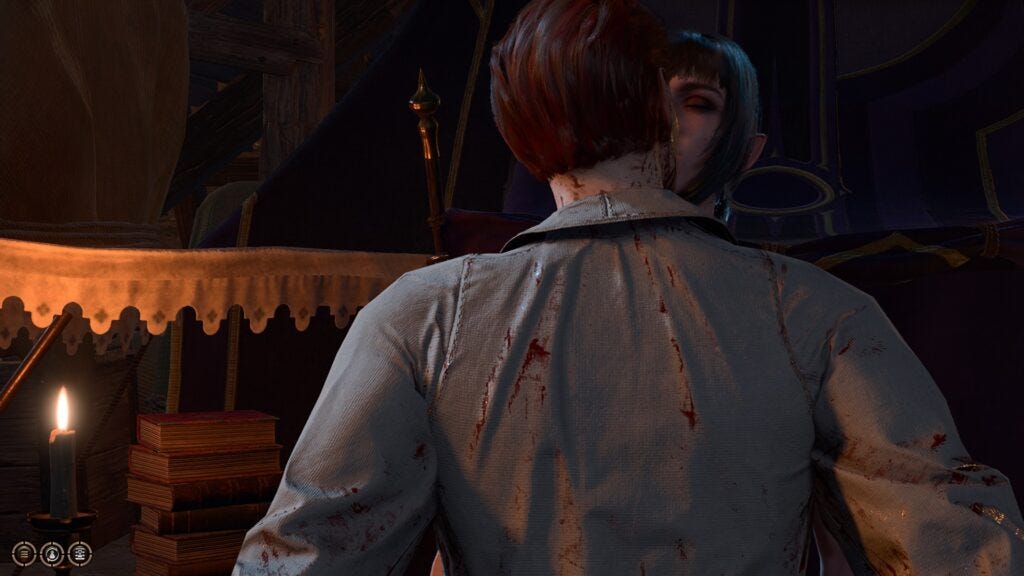Today I felt sunlight on my skin for the first time in a week, for today, after seven days of toil, I have at last completed Baldur's Gate 3. At every turn the game conspired to rob me of this victory: twice last night was my save file corrupted on the eve of triumph, yet twice did I troubleshoot and persevere. Crashes and performance issues plagued my every moment, but these were no match for my conviction.
I have won. I have finished Baldur's Gate 3. It took me seventy hours.
I am the 0.3%
My thoughts on a game have never been so conflicted. When I reviewed Aliens: Dark Descent, I knew that, despite its many issues, it was an excellent experience overall. When I reviewed System Shock, I knew that, despite its many virtues, it was a poor experience overall.
Baldur's Gate 3 is not so simple. It is both the most frustrating RPG I've ever played, and one of the best. It is brilliantly written in many places, and horribly written in many others. Its sidequests are among the best in the genre, but a few are undoubtedly among the worst. The faithfully adapted 5E combat far surpasses the Infinity Engine real-time model used by most other cRPGs, yet is also a slog. And while the design of the campaign is an impressive achievement in many respects, it would be no exaggeration to say my playthrough was ruined by technical issues. Not small issues as in Dark Descent, but actual game-breaking, experience-ruining bugs that almost led to my giving up.
My opinion on the game changed wildly day-by-day. Act I is extraordinary. It is perfect. Everything about it is good. Act I alone, which is what Early Access always was, is the best RPG I have ever played. I would have said as much if I'd stopped and written my review then. It would have been the most glowing recommendation I've ever given. I loved Act I.
Act II is not extraordinary. It is uneven and frustrating, with too much combat and the game's worst narrative design. Bugs made progress almost impossible, and my PC's performance was never worse. Had I stopped playing and written my review then, it would have been overwhelmingly negative, with a list of frustrations fifty pages long. I hated Act II.
But Act III is fantastic. It fails to achieve the heights of Act I, but features excellent writing, interesting side quests, and engaging combat encounters. I really liked Act III--and this is where I write my review.
Unpacking my thoughts and setting forth my criticisms will not be concise. There is much to discuss. I have paeans and dirges alike to offer, and I intend to give both. So let us waste no more time with lead-in.
Minor story spoilers should be expected to follow. I simply cannot analyze this game without giving some things away, like character names and locations. Be forewarned.
The Game
First, select your character. Like in the Divinity: Original Sin games, you can either create a custom
PC, or use one of the companions as your protagonist--a so-called 'Origin' character. Origin characters cannot be customized and have different main quests to help guide them through the story. The idea of turning NPCs into protagonists is fascinating, but BG3's strongest elements are in its relationships: if I had opted to play as Shadowheart, rather than as Shadowheart's boyfriend, my experience with the story would have likely been much less satisfying. (More on that later.)
One Origin is customizable, however: the Dark Urge. My impression is that the the Dark Urge is the intended way to play the game. His story is deeply interconnected with the first two games in a way I cannot imagine being the case for any of the other Origin PCs. For that reason, I chose him for my first playthrough.
Customization is comprehensive and malleable, with no class restrictions or racial stat bonuses. You can make any character you like. A charismatic half-orc? A burly gnome? Go right ahead. Appearance options are better than average for a game like this, but still bizarrely lacking in long hairstyles.
As in Cyberpunk 2077, there is also a genital slider. As in Cyberpunk 2077, this does nothing and has no effect on gameplay or sexuality. You can choose if you want a big or small penis, circumcised or uncircumcised, and your body type needn't match your genitalia. You can also take off your underwear at any point in the game, and the underwear of any NPC, if you want to verify anything for yourself.
This is just what Baldur's Gate always needed. I don't know how I'll go back to the old games now.
Removing clothes and underwear aside, you will never actually see genitalia in your playthrough. Of the two sex scenes I received, one carefully managed camera placement so that only the slightest few pixels of my character's groin were visible at any given time. The other was audio-only.
This is, in other words, a gratuitous and pointless feature. Ironically, the genitalia that is always visible and completely uncensored in sex scenes--a woman's breasts--is NOT customizable. Every woman in BG3 has the same cup size. This customization would have actually been welcome; what we receive instead was not.
Because what I always wanted in life was to see Minsc's cock. Uncircumcised, BTW.
With your class and genitals set, you thus awaken on an Illithid spaceship. A "tadpole" has been inserted into your brain by a mindflayer. You have days before you yourself turn into a soulless, squid-faced monstrosity. Your only hope is to band together with the other Origin characters, who have all likewise been infected, to find a cure--as soon as possible.
My character started his life as a half-elf Paladin. His dark urges for murder and mayhem stood in eternal conflict with his oath to uphold goodness and justice and peace (etc.). This quickly revealed itself to be a mistake. Baldur's Gate 3's early game is marked by low attack bonuses and constant misses. I found Paladin to be unbearably frustrating, so I reclassed into Ranger.
Yes, you read that right. At any point in the game, for the pittance of 100 gold, you can respecialize however you see fit. Tired of being a Fighter at level 12? Become a Wizard instead!
This can be done not only for the main character, but also any companion NPC. Here I am at level 12 turning Shadowheart, whose entire storyline is about being a Cleric to Shar, into a Druid. For 100 gold.
This does not affect story, as far as I can tell.
The decision to enable so much flexibility is both bizarre and welcome. BG3 is a colossal game. I had played Early Access, so I skipped and skimmed a significant amount of dialogue, and I knew how to solve many of the quests ahead of time. I also played on Balanced difficulty primarily, rather than Tactician. Had either of these things not been the case, I could have easily spent over 100 hours with my playthrough.
Having to spend 100 hours with a character whose spec is completely fucked up--like I always have, inevitably, in the Pillars of Eternity games--is not good game design. So I support the notion in principle. But it's also strange that the barrier to reclassing is so low. It is basically free, and the NPC who offers it is in camp--so you can do it between fights, instantly, whenever taking a long rest.
It turned out to be for the better. After eight levels of Ranger, I was beginning to feel underpowered relative to the other classes. I respecialized into Ranger/Fighter, planning on going 8 Ranger / 4 Fighter.
As I realized how useless Ranger spells were, however, this quickly morphed into 4 Ranger/8 Fighter. By the end of the game I gave up on Ranger entirely, and played as an archer/dual wielder Dex-based Fighter, with no multiclass. This proved the correct decision, because I was the most tremendously overpowered character in my party. I comfortably soloed two major bosses, in a single turn, with nothing but Haste potions and my bow.
The multiclass rules work easily and intuitively. It might be possible to ruin your character with them if you aren't careful, but the affordability of resetting everything and starting over--without having to replay 90 hours of content--eliminates this risk.
Had it been up to me, I would have removed the ability to change companion NPC classes. It fucks up the story too badly and isn't necessary anyway. But such flexibility does have the advantage of allowing for more dynamic party compositions. If your favorite companions are Karlach and Lae'zel, but you're playing a Barbarian, it is obviously suboptimal to have one or either of these characters in your party. The Dragon Age games have always suffered from this problem. But if you respec Karlach into a Druid, and Lae'zel into a Monk, such a thing makes much more strategic sense.
But it really does fuck up the story.
I don't think including these options was a mistake, but I do wish the barrier had been a bit higher. 1000 gold would have been fair. 100 is too low.
Much like Solasta: Crown of the Magister, an excellent dungeon-delving D&D simulator released in 2021, Baldur's Gate 3 is a faithful adaptation of Dungeons & Dragons: Fifth Edition into video game format. Gone are the days of real-time translations of turn-based games; BG3 is, mercifully, completely turned-based in combat. An emphasis on environmental interactions with hundreds of spells at your disposal, to say nothing of potions and bombs, is reminiscent of Divinity: Original Sin 2, with a stronger focus on RNG.
This was clearly an attempt to capture the imagination-driven nature of a tabletop roleplaying game, and Larian did an excellent job. The openess of encounters in this game is marvelous. Sneak past enemies, ambush them, talk to them, rush in head-first, or prepare a few fireballs to incinerate them before they know you're there: Baldur's Gate 3 is basically an immersive sim.
But it's ultimately still burdened by the mantle of Dungeons & Dragons. The over-reliance on randomness adds nothing except a strong incentive to reload whenever things don't go the wrong way, while severely diluting the player's ability to manage encounters. This is exemplified nowhere better than in initiative.
Like in 5E, initiative is 1d8 + Dexterity + feats. Every entity in combat rolls initiative separately. Usually my Fighter went first while my Cleric went last. Enemies and allies would fall somewhere in the middle. But not always. Sometimes I got unlucky; everyone in my party would roll a 1 on initiative, while every opponent would roll an 8. In a fight where you're supposed to rescue an important NPC before she can be killed, this bad luck made the encounter literally impossible. She would die before I had a chance to act. There was nothing I could do.
When I reloaded an earlier save, I now rolled well on initiative, while the enemy NPCs rolled poorly. The fight was then trivially easy.
This is the case for a huge number of fights throughout the game. Going first instead of last is the difference between sleepwalking to victory and clawing desperately for every inch, especially when friendly NPCs are involved. Larian could have ameliorated this element of 5E, but they didn't: they let RNG reign.
On a more philosophical level of game design, RNG combined with readily available quickload functionality ultimately accomplishes nothing. There's a major story event that required a critical success for me to get the outcome I wanted most. It took fifty or sixty tries before I finally got it, but I wasn't going to give up until I rolled that 20.
This was pointless. If I can spend an hour savescumming the optimal outcome, I probably will. That's just how I play games. Therefore the middleman should be removed. Obsidian made the right decision in New Vegas by removing RNG from skill checks, instead making everything of this sort be threshold based.
If you really want that chest opened, be prepared to reload. A lot.
But the design problems with Dungeons & Dragons run deeper than RNG. I have no qualms saying that Fifth Edition is a bad game. It's messy and contrived and overcomplicated. D20s are a terrible, swingy basis for skill checks, and AC is a ridiculous and antiquated system. But its worst problem, as is perennial in D&D, is its terrible incentive structure. You get XP for killing monsters (or whenever the GM wants to give it out). There are no personal goals or beliefs to play toward like in Torchbearer or Apocalypse Engine games. Your objective is always to kill things: not only because this is the main way to level up, but also because things always have loot.
No real attempt has been made to change this aspect of the rules. Talking your way past a group of guards in Baldur's Gate 3 will never net you experience. Neither will picking locks or disarming traps. XP is solely awarded for mayhem and slaughter, in addition to a pittance for completing quests. There are a number of enemies you can talk down throughout the game, as would be expected, but often these are the same enemies that will have high level equipment: killing them is the sole way to get it. You are thus doubly punished for avoiding combat, and so the designers makes it clear: Baldur's Gate 3 is a game about fighting people. It is not Fallout. You cannot defeat the final boss with Persuasion. If you don't murder the man wearing yellow armor, even if he's friendly, you're playing the game wrong.
I guess the incentive to be a murderhobo does very much reflect the way most people play tabletop D&D. But it is not ideal.
BG3 is filled with combat, and the last ten hours in particular have very little time for diplomacy. For this reason I would say that it is as much of a tactical adventure game as it is a cRPG. Baldur's Gate 3 is about killing things. You cannot play it as a pacifist. There is no such thing.
Not that this is a great crime. I would have preferred more nuance in incentives, but BG3 is 5E. It's a good, direct adaptation of a mediocre ruleset, and the core mechanics are fun. The first 60 hours are tactically engaging and filled with unique opportunities for players to make their own way. That own way just has to include murder, most of the time.
But combat at higher levels becomes a chore. The encounters are too easy and the stakes are too low. My Dark Urge Fighter had 25 AC at level 12, attacked three times per turn (or six with action surge, or NINE with Haste), did 25+ damage with each hit, had 95% chance to hit on every shot, and had more than 100 HP. Even on Tactician, every fight was trivial with this arrangement.
Some attempt was made to mix up the endgame battles and introduce new mechanics for boss fights, but with dubious success. These are more frustrating than they are engaging.
By the time you have an entourage of a cambion, a diva, an elemental, and six ghouls, every fight is trivial.
Ten hours in, you unlock the ability to use special Illithid powers. These add a unique progression element to the game and help give some sense that progress is still being made between the vast gulfs of playtime spent at the same level. But like Divinity: Original Sin 2, BG3 has far too many active abilities. Dozens on a single bar, or more. Most of the brainworm powers do nothing more than add additional abilities that you'll forget to use.
I am convinced that no human being is capable of remembering to use all of these abilities, even on the rare occasions where they would be useful.
By far my biggest frustration with the gameplay is the controls. Unlike the first two Baldur's Gates in the Infinity Engine, the party has no formations or marching order. Instead the three companions will follow the selected character awkwardly and clumsily.
See a trap on the ground? Step forward to disarm it without hitting G first and be prepared for everyone in your party to rush ahead of you, setting it off. Even more commonly, combat will end while a concentration AoE spell like Cloud of Daggers is still active; watch as your entire party kills itself walking through that one danger area. This seems to happen to me after every fight.
But the real problems are in the camera. Despite a heavy emphasis on verticality in different arenas, there is no way to manually change Z-level. This means that whatever plane you're on is decided by the game guessing what you're trying to click on. It will usually guess wrong.
Above see my summoned diva who, while attempting to move a few inches closer to an enemy, decided it made more sense to fly to the roof of the building we were in. The only way for me to get him back down was to zoom in and try to click through that small skylight. A similar scenario saw an imp fly up to a rafter which I literally could not see, no matter what I did, thus making him unclickable.
Here's a screenshot of Shadowheart attempting to enter into a room during the worst quest in the game. The camera has decided that I should go directly to the floor above where I need to enter. If I try to walk her inside, she'll instead think I mean the upper storey, and do nothing out of confusion. It was actually impossible for me to get her where she needed to go without carefully walking her to the threshold, zooming in, and trying to click through the doorway.
Stairs are even more agonizing. You won't see the next Z-level until you're standing on the topmost step. If you attempt to click up to where the next storey should be, you'll actually click through the floor and start going back down the stairs. This is annoying out of combat. In combat it's terminal.
A Tour of Bugs
The camera is really the least of the game's technical issues. BG3 is the most technically deficient game I've played since Fallout: New Vegas. That should be no surprise: the campaign is unbelievably long and girthy, and there's no way that some small bumps and blemishes weren't going to sneak through the fingers.
But these are not small bumps and blemishes. They are major issues. Before moving on to what really matters for a game like this (the story), I thought I would catalogue some of the most amusing and debilitating from my playthrough. The praise I have to offer of the narrative means nothing if the game is unplayable, and for me, it nearly was.
Here we see Wyll killing himself after a Long Rest by standing on top of a candle. The first time it happened, I woke up to find him dead. The second time I was just fast enough to catch his final moments before he went up in flames. This same bug pervades Act III: companion NPCs constantly set themselves on fire in camp.
Here is Halsin the Druid who, after joining my party, transformed into a saber tooth tiger--and stayed transformed in the ensuing cutscene. This would have been fine, were it not for the camera...
...which is not designed...
...with such a thing in mind.
Druids are supposed to transform back into human shape during conversations, just so we're clear.
You may have thought that Mizora turning Wyll into a demon was a horrific punishment for his crimes, but in fact the true punishment was that she stole his arms.
Of all the books in this game, I think this one was my favorite to read. I hope we get a MOO_GloryOfTheAbsolute DLC.
When Halsin died late in my campaign, I could use Speak With Dead on him. Despite having been killed by a demon in Act III, he seemed to think he had been killed in Act I by a goblin.
In this screenshot we see that Gale still has an option concerning the true nature of the "Nightsong." The problem is that this is from Act III, and we already have identified, discovered, and recovered the Nightsong--about forty hours previously.
An interesting name for an area.
Big Huido looks suspiciously like a poorly textured staircase, but not so much as Dolly Dolly Dolly looks like a floorboard:
But these issues are all very minor. This is to be expected on release for a huge game like this, and most don't make any difference.
The same cannot be said for the following error:
At approximately 60 hours played, I received this error. I would fail out of loading any of my recent saves. My file was corrupted.
I managed to get into a quicksave from two hours previously after a bit of fiddling around. It turned out that the use of summons was/is breaking save files in certain zones. But before I figured this out, I thought my entire campaign was gone. Thankfully I practice good save hygiene, but many others on the Steam forums do not, and they have lost everything. Looking back now, all of my endgame saves are corrupted. Thankfully I had foreseen this, so I pressed forward for several hours to make sure I beat the game in a single go. Otherwise I would have lost another night of progress.
This is a horrendous bug. It must be fixed ASAP.
Act II is where the technical problems become very severe. Beyond everything mentioned above, the far more insidious bugs relating to dialogue and quest markers begin. I missed multiple important conversations relating to the plot...because they never played. A major story element is Shadowheart's magic artifact; in Act I, she's jealous enough over guarding it that she will kill anyone who tries to take it away. But later on there's an event where she gives it to the player.
The event never triggered. It simply teleported into my inventory, mysteriously, without explanation.
Romancing Shadowheart, we also experienced our first kiss--twice! The major Act I romance sequence repeated itself, identically, for no reason. This had no further consequences, but I was paralyzed with fear that my romance attempt had been somehow corrupted. At the end of Act II, my allies attacked me for trespassing...in the enemy base I'd just cleared out.
The list goes on.
Finally, the game currently suffers from a memory leak. Despite being above the recommended specs, I endured constant stuttering and endless FPS lag over the course of my playthrough. The latest NVIDIA drivers improved performance yesterday, but it isn't entirely fixed yet.
There is no excuse for Baldur's Gate 3 to be using this much RAM and system power.
The Story
One of the most spectacular features of Act I is that every dead NPC can be spoken to using the "Speak With Dead" spell. Every corpse, no matter how insignificant, will have something to say. They will help you solve puzzles and find treasure and work out where to go next in the quest, or simply add flavor and background to the environment. The same is true for animals; every beast always has something to say.
But it isn't just animals and corpses. Every living NPC has something to say. Every character has a name and is voice acted. The world feels entrancingly alive.
It is no exaggeration to say that the first twenty or thirty hours of Baldur's Gate 3 are among the best in any roleplaying game ever made. I cannot express how much I loved Act I, especially when I first played it in Early Access earlier in April. The characters are fascinating, full of personality, and have rich backstories to uncover.
The quests are best of all. The narrative is as non-linear as a Fallout game. The default path seems to be siding with the Grove of Druids against the Absolute and its goblin hordes, but this is an illusion. You can side with the goblins, if you prefer, and receive a completely different experience. I cannot remember the last time I played a cRPG with this much player reactivity. Pillars of Eternity II comes close, but BG3 is really in its own league.
It doesn't last. Act II sheds reactivity in exchange for a railroad. Corpses, even ones who should have something to say, are mute. Animals fall silent. NPCs each have a single line and nothing more. While I wouldn't call it linear, the outcome feels increasingly forced, and by the time you meet the Absolute at the act's finale, you will be wondering why your entire party is sitting around, allowing the bad guys to get away with their plans, doing nothing when they could be resolving the plot. This happens in two revoltingly egregious locations and is a minor issue in countless others.
The main story is rarely a strong point in cRPGs. Pillars 2 is the only game in this genre where the central plotline is a highlight, rather than a chore. Instead these games excel at companion characters, side quests, and bonus content. I'm usually willing to forgive flaws in the central plot if these other elements are good.
I don't know whether I like Baldur's Gate 3's story or not. Its restricted scope and direct focus is excellent in Act I, but as the story expands, so too do the crutches used by the writers. In Act III, you are regularly ambushed by one of the major antagonists. But if you try to fight her, she says, "Nah bro. ur not rdy yet. we'll fight when I DECIDE."
This is infuriating in a game that is supposedly non-linear and open-ended. The problem only gets worse as time goes on, leading up to the final encounter: there are four checks in a row that require nat 20s to succeed. I decided to savescum my way to victory, only for the game to have me lose anyway--as if winning was impossible and hadn't even been considered. Rolling four 20s in a row resulted in no different an outcome than rolling zero.
That is a railroad.
Act III vastly improves on II's flaws otherwise, however. The story is more engaging and full of great quests with highly variable outcomes, although the uselessness of Speak With dead remains infuriating. Exploring Baldur's Gate (the city) is fascinating and straight out of Dishonored or Deus Ex. As the Dark Urge's true identity is revealed, my investment in the narrative and my main character's fate increased massively, and while it could have been done better, I was supremely satisfied with how everything worked out.
This is a metaphor for the storyline as a whole, I think. I have major problems with how the fight against the Absolute and the Illithids is written. The narrative designers rely heavily on pre-established lore and setting details to resolve and drive their plot, rather than having the plot drive and resolve itself. Act II and III are full of Deus ex machina moments, where victory is subverted or (conversely) failure averted through a last-minute addition of some contrived new detail. Constant reasons are introduced for the plot to continue on, when really it should just end early. Characters at this point often make extreme or insane decision at the face of almost no persuasion or discussion, often in a way that's reminiscent of Bethesda. To say this is a disappointment would be to say too little. There are several scenes highly reminiscent of the above linked from FO4.
I won't lie or pretend that I like Faerun and the Forgotten Realms as a setting. I don't. I can't stand FR. It has no aesthetic sense at all. It's my least favorite of all major mainstream fantasy settings, and I would never consider playing a tabletop D&D campaign in it. But I am moderately familiar with the lore--and even I felt like I was at sea half of the time.
Here is a minor, spoiler-free example from Wyll. This is a line of dialogue where I am expected to know who Tiamat and Zariel are, and understand their relationship with Mizora (a minor character), in order to appreciate what's happening. I don't even know who Tiamat and Zariel are. Throughout the game, and especially toward its conclusion, the narrative is rife with dialogue like this. These details often makes a major difference in the story.
Ultimately, by the conclusion of Act III, the main storyline is so contrived and confusing that the optimal path toward my preferred outcome becomes obscured. This led to immense apathy. Should I side with Illithids, the Gith, the Dream Visitor, or forge my own path? Which option will lead to where I want to end up? I know which ending I want, but I don't know how to get there. This is because the writers have relied so much on awful D&D setting information that the lore, rather than narrative, is driving the outcome of the plot.
Contrast this with a game like Dragon Age: Origins. At the end of Origins, a twist--that the one who kills the Archdemon must himself die--is introduced. It makes sense and is intuitively connected to the lore established in the prologue concerning Gray Wardens. Morrigan then offers a way out, relying on lore, adding in another twist that was also set up at the beginning of the game. You must then make a decision:
Will I perform the Dark Ritual?
If I don't, who will die?
Loghain
Alistair
Me
The consequences of any of these decisions is obviously telegraphed. If you sacrifice yourself, you will die. There you have it. It isn't more complicated than that. A good RPG should have player consequences be that obvious.
This is not the case in Baldur's Gate 3.
Yet with all of this said, I ended up getting the best outcome. So I can't complain too much, except to stay that it felt a bit too idyllic in the end.
But still. When the Absolute and its motivations are revealed, they are stunningly contrived and very confusing. I found myself constantly wishing for a pause button so I could parse through the over-complicated dialogue. I'm taking it on good faith that the Absolute's plan actually makes sense, but I don't think it does.
The main story has its highlights, but it is not the strength of this game.
All of this is pretty much a sideshow. The most important question about an attempt at a BioWare-style old school cRPG in the vein of Baldur's Gate and KotOR is whether or not the characters are engaging and well-written. Nothing else about BG3 matters to me. Companions are the most important part of a game like this. So are the companions in BG3 good?
Yes. The cast is large, beginning with six (or five if you play as an Origin), and later expands to include at least four more. A number of characters, such as Minsc and Jaheira, return from Baldur's Gate 2, but I found them to be much weaker than the original characters created by Larian. Did we really need to see Minsc again? Did we really need to see his cock? Does he have to be constantly talking about his space hamster?
For me, the answer is definitively no.
But I really like the original cast. They come on strong and lack the charisma of companions in David Gaider's RPGs (KotOR1 and Dragon Age), but they have good, naturalistic dialogue and distinctive personalities, backstories, and motivations, and great voice acting. A lot of players are complaining that they talk too much like Joss Whedon characters, and while this is probably true, it's far preferable to what we normally receive in RPGs these days.
Of course I prefer some more than others. Lae'zel and Karlach are unbearable, in my opinion, while Shadowheart and Gale are great. But this is going to fall down to personal preference. A lot of people like Karlach for some reason, so I won't criticize her characterization.
What's most important to note is that this is the first game since Inquisition nine years ago to feature a companion approval and romance system. It's almost identical to what we see in Origins, with the major exception of gift giving.
I romanced Shadowheart, and the arc she experienced as a result is the best writing I've seen in a video game in a decade. Her story, as she struggles with her identity as a Shar worshipper and tries to figure out who to be, is simply phenomenal. Her characterization completely changes as a result of your actions based on whether you allow her to doom herself to Shar or turn to the light and find redemption--which is clearly what she needs. By the time her arc is resolved, I was immensely satisfied. Every line of party dialogue, where she was no longer gothy and sad but happy and witty, was delicious.
Writing arcs for companion characters in RPGs is extremely challenging. How does a character have a satisfying arc, when every specific detail of her journey is dependent on character actions? Almost no one has ever pulled it off except David Gaider, with Morrigan in Dragon Age: Origins.
Shadowheart isn't as compelling as Morrigan. But she's the closest we've ever come to capturing that same magic. Larian pulled it off.
As for the other companions, I can't say. I thought Gale's story was interesting, but it never went anywhere (I might have missed something). I liked Wyll's psychodrama at first, but it quickly became tiresome; although he's not a bad character in the abstract, and he has wants and desires and flaws, he has no charisma or personality. He is very boring. I was skipping most of my dialogue with him by the end.
I'm saving my interactions with the other companions for my next playthrough. While I would bet that Shadowheart is the best overall, I'm sure the others are still good.
So comparisons back to Dragon Age: Origins are as obvious as they are intentional. I use such comparisons mostly as a form of praise. But this same standard also draws forth my major criticism of how the companions are written: compared to a Dragon Age game, they are shallow.
One of the best things about Inquisition is how your companions seem to have their own lives whenever you return to Skyhold. There's always something going on in camp. The characters fight with each other, they argue, they play, they spar, they dance; Skyhold feels thrillingly alive. Checking in on Cullen is always a reward, because you get some new scene of him struggling with lyrium withdrawl, or filling out his taxes, or whatever else is going on in his life at that moment.
With one very notable exception, BG3 has nothing like this. Companions will occasionally have things to say in camp, but they never interact with each other, and they mostly stay put in their tents. If you check in on them, they will add in one line of dialogue about whatever most recently happened--"That fight with those Illithids sure was tough, eh?"--and nothing more. These single-line comments are often sentimentally identical between everyone in camp, too, so they're more like punishment for clicking on your friends than a reward. I do not need, "So Wyll is a warlock. Cool." to be repeated eight times with slightly different verbiage; I get it.
Shadowheart is not a shallow character. She's complex and interesting. But when I return to camp to speak with her, she never has anything new to say--except when the story is progressing--and she rarely has new dialogue options. Compared to Morrigan, her dialogue trees are feeble and unimpressive.
Although you can kiss her while covered in blood. So that's something.
For such a huge game, with so many different characters to talk to and places to explore, I find this disappointing. Origins had countless small but memorable character moments: when the dog steals Morrigan's underwear, or when Sten has a growling contest with the dog. These are but two small examples. The absence of similar moments in a game so obviously inspired by Origins is severely felt.
I'm also underwhelmed by her and other companions' reactions to significant plot events. The revelation of the Dark Urge's true identity is HEAVY; when you go around telling it to your friends, they have nothing to say except, "That's crazy. Back to the road, then?"
Remember how the party reacts when you discover that you are Revan in KotOR? It's an epic scene that can lead to party member death. BG3 needed much more of that. There are brief moments of introspection after Act I, and a bit after Act II, but it isn't nearly enough.
There are Origins-style party dialogues between companions while exploring, however, and these are excellent (although they're a tad slow on the back-and-forth).
The choice to make every character bisexual, unlike the Dragon Age games, does a lot to undermine the strength of the cast. This doesn't bother me as much as it appears to bother some other people online, but my three bros Gale, Wyll, and Astarion all flirted with me aggressively, as though I'm the one hot chick at a party. This is weird. It's not realistic, and it ruins the bromance we had bubbling.
Dorian is gay in Inquisition. This fact plays into his character and personality. He will flirt with you subtly if you are a male character. If you turn him down, the two of you don't halt the progress of your relationship: you continue to have an epic bromance that rivals anything written in any other game. The friendship between Harold and Dorian is palpable. It's so good.
You can be friends with Gale after you tell him that you don't want to fuck. But there's nothing like that transition to pure friendship. Things seem to stop abruptly. And I hate that my dialogue options don't reflect how I actually feel whenever this happens--which is a problem found throughout the whole of the game.
I'm again reminded of Origins. The relationship between a male Warden and Morrigan is nothing like the relationship between a between a female Warden and Morrigan. Everything changes. The nature of how the characters interact is completely different, and Morrigan grows in very different ways. Both are brilliant, but they are not interchangeable. This is because two women have different kinds of relationships than one hot man and one hot woman can have. That isn't a judgment. That isn't an ideological statement. It's a simple fact of human social dynamics.
BG3 does not seem to care. Gale treats a male Dark Urge the exact same way he treats a female Dark Urge. This is unrealistic and lazy, to be frank, and Larian should have done better.
It isn't a dealbreaker. The companions are still very good. But they aren't as good as in Origins and Inquisition, or perhaps even KotOR, when I feel like they easily could have been.
There's So Much More
Baldur's Gate 3 is like diving into a swimming pool. You find yourself deep underwater with no bottom in sight. The water is cool and refreshing, evoking memories of summer days from childhood. But as you get closer toward the steps, its sides begin to narrow. Soon your toes scrape against the ground. The depth was just an illusion. Most of the pool is far too shallow for any kind of dive, and you don't have all that much room to swim around in after all.
The water is still cool. It's still refreshing. It's still nostalgic. The pool is still nice. But it isn't as deep as you'd hoped.
Act I is the deep end. It is brilliant, thrilling, and very long. But the whole game cannot sustain that level of quality. The rest of the story then vacillates from high highs to low lows, but the depth of the beginning is never found again. The shallower ends of Act II and III are still good. They're still worth playing. Were they any other RPG, I would recommend them. But they're not what Early Access had seemed to promise.
I've barely even started this review. There is so much more to discuss. There's so much more that I like and so much more like I loathe about Baldur's Gate 3. I have serious qualms with the way the player's dialogue options are written, and I strongly dislike the Dark Urge's character quest in Act II. I think that many of the minor annoyances that a player is likely to experience are present for no reason except that Larian was determined to make this game multiplayer, and I haven't even mentioned how much I like the score (I do. It's great.). I had intended to write about all of this and much more when I started taking notes.
But I think I've said enough. You get the idea. Baldur's Gate 3 is a good game. It may even be a great game. It has countless moments of brilliance and phenomenal side characters, who are among the best in the entire genre. I don't know if they match up to BioWare in its prime, but they come very close. No RPG like this has come out since The Witcher 3. It has singlehandedly brought serious cRPGs back into the mainstream. There is no one for whom I would not recommend it.
...or that's what I would say, were it not for the bugs. The bugs nearly ruined my experience. They tested my patience and made me hurried when I should have been relaxed. They led me to dislike this game much more than I would have otherwise. They are what make me the most trepidatious about giving a recommendation.
If you don't mind the risk of having your save corrupted and dialogue sequences skipping themselves, have at it. You will enjoy BG3. But otherwise I strongly urge you to wait. Give it a month. Maybe even give it a year. You will play a significantly better game than I did. And when all of these issues are fixed, anyone who likes RPGs has to give Baldur's Gate 3 a go.
I played the game on PC with a purchase from Steam. Total playtime: 55 hours according to my save file, but 70 hours according to Steam. The difference is probably the result of savescumming and being forced to replay content; I wouldn't be surprised if I lost about 15 hours between the two by the end.


